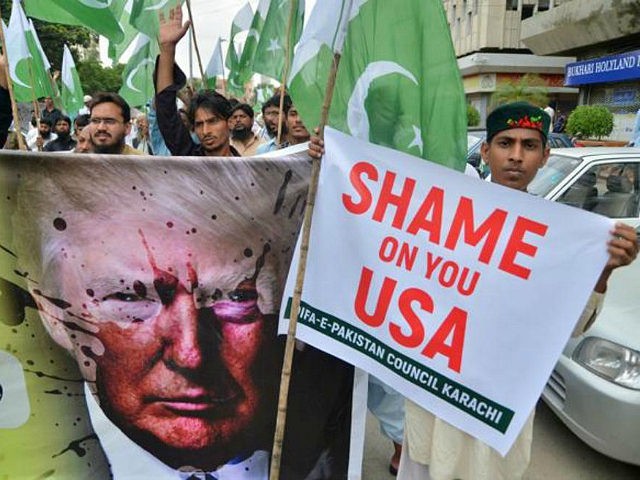Pakistani officials insisted they will do no more to help the United States in the war on terrorism on Monday and summoned Washington’s ambassador in response to President Donald Trump’s criticism that the nation had given America “nothing but lies & deceit” in exchange for billions in aid.
Trump accused Pakistan of pocketing aid money meant to help fight the Taliban and other jihadist groups. Pakistan has long faced criticism from both the West and neighbors like Afghanistan and India for allegedly providing “safe havens” for terrorist groups to operate in. Pakistan instead insists that Afghanistan has not done enough to contain the Taliban, and has claimed that India is a state sponsor of terrorism, allegedly harboring violent Hindu extremist groups.
“We have already said ‘no more’ to America, so Trump’s ‘no more’ has no importance. We are ready to give all account for every single penny to America in public,” Pakistani Foreign Minister Khawaja Asif said in a statement in response to Trump on Monday. “The United States should hold its own people accountable for its failures in Afghanistan.”
Asif also said that Pakistan is not concerned with the potential of losing billions in American taxpayers’ dollars.
Pakistan’s defense ministry also responded to the president via Twitter:
The statement is an official declaration from Defense Minister Khurram Dastgir-Khan.
The Pakistan Foreign Office responded by summoning American Ambassador David Hale and demanding he explain the tweet, according to the nation’s Express Tribune.
“The United States has foolishly given Pakistan more than 33 billion dollars in aid over the last 15 years, and they have given us nothing but lies & deceit, thinking of our leaders as fools,” Trump posted on Twitter early on January 1. “They give safe haven to the terrorists we hunt in Afghanistan, with little help. No more!”
At press time it is not clear whether Trump has ordered executive action to implement a new strategy to fight terrorist in the region that defunds cooperation with Islamabad. Trump has long indicated that he hopes to limit foreign investment in nations that remain hostile to American interests. Most recently, in August, Trump said was exploring a “change in our approach to Pakistan.”
“We can no longer be silent about Pakistan’s safe havens for terrorist organizations, the Taliban and other groups that pose a threat to the region and beyond,” he said at the time in a speech at a military meeting in Fort Meyer.
Officials throughout the U.S. government have consistently warned that Pakistani officials are not doing enough to stop terrorists from establishing themselves on their territory.
Top commander in Afghanistan U.S. Gen. John Nicholson warned in 2016 that “not adequate pressure [is] being put on the Haqqanis,” referring to the jihadist Haqqani network, which operates in part in Pakistan. At the time, evidence suggested that senior Afghan Taliban leaders enjoyed free range in parts of Pakistan. In March of last year, Rep. Ted Poe (R-TX) formally sought to brand Pakistan a state sponsor of terrorism.
Later that year, a multilateral statement from the coalition of BRICS (Brazil, Russia, India, China, South Africa) appeared to condemn Pakistan without naming it, expressing “concern” for activity by the Taliban and others and expressing support for the Afghan, but not Pakistani, government. Pakistan condemned the statement.
Following pressure from the United States, reports surfaced in Pakistani media that Islamabad officials were contemplating ending cooperation with the United States “if U.S. President Donald Trump’s administration insists on pressuring Islamabad to stop harboring terrorists.”
The Trump administration’s National Security Strategy (NSS) orders the relevant agencies to “press Pakistan to intensify its counterterrorism efforts, since no partnership can survive a country’s support for militants and terrorists who target a partner’s own service members and officials.”
“We will insist that Pakistan take decisive action against militant and terrorist groups operating from its soil. We will work with the Central Asian states to guarantee access to the region to support our counterterrorism efforts,” the text reads.

COMMENTS
Please let us know if you're having issues with commenting.